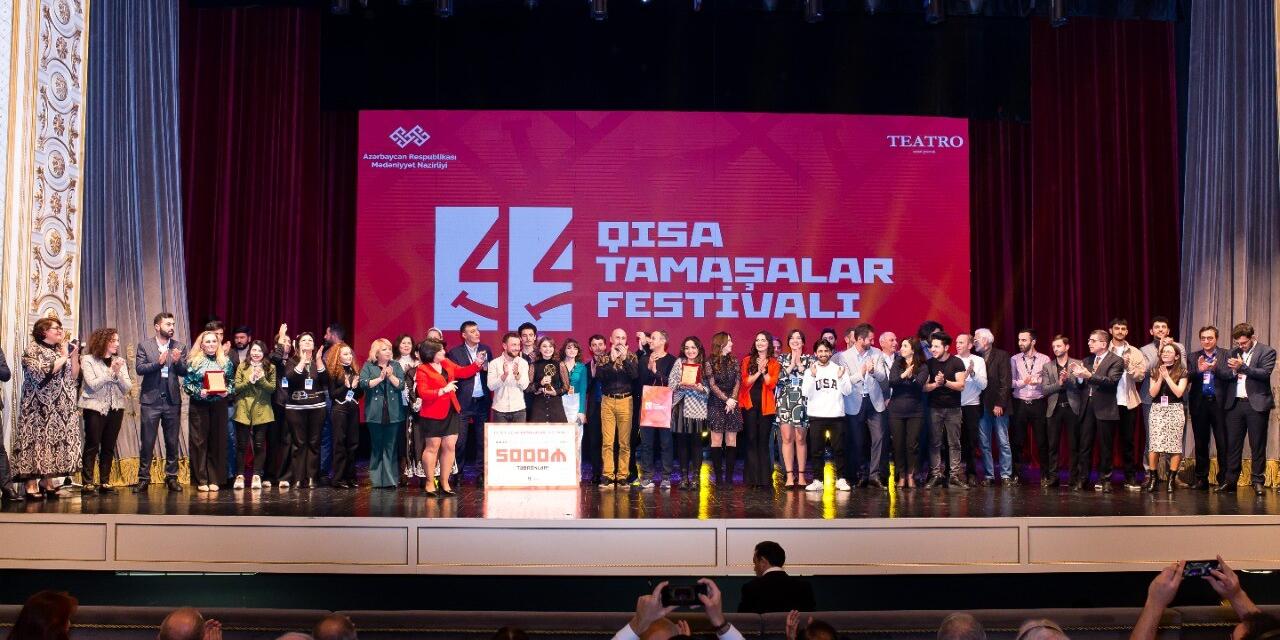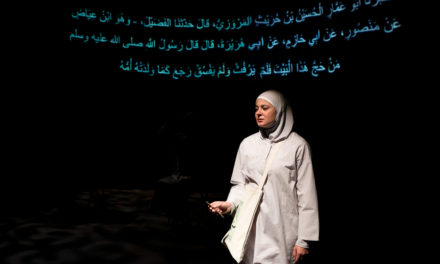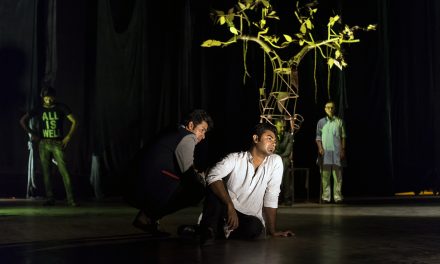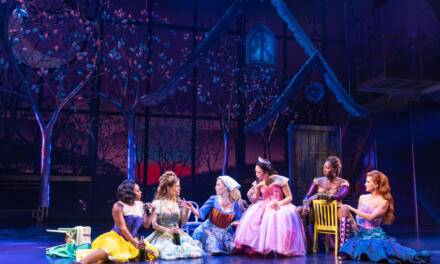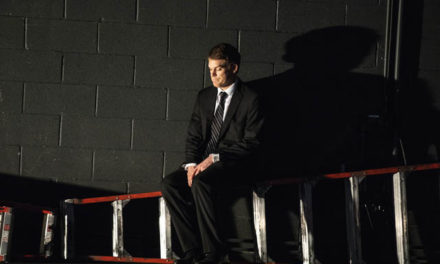When the non-peaceful world is illuminated by the bursts of shells, it seems that other illuminations fade in these bursts. But this impression is false, and even to the roar of the cannons, the muses are not silent. 4.4 Short Performances Festival, which ended in the capital of Azerbaijan, proved convincingly and vividly that the theatre today is more than just leisure, experimentation, and therapy. The variety of plays allows us not only to form an impression of the development of Azerbaijani theatre (although little is known about it in the world) but also to demonstrate the totality of theatrical art and to find the causes and consequences of the most difficult and painful pages of history that can neither be torn out nor rewritten.
4.4 is not an average score for the festival’s productions. The title contains a reference to both the Four-Day April War and the 44-day Second Karabakh War. It would seem that this symbolism in the title could have been imprinted too ideologically, but fortunately, this did not happen. The performances, united by the theme of a message of world peace, of the horrors of war, fever, loss, suffering, and resistance to despondency, despite the varying quality of the productions, were not perceived as something artificial or created with intent instead of thought. Pantomime, puppet theatre, mono-performances, drama, clowning, theatre for children, and performance – different formats and genres were organically intertwined here. It was not the timeframe that determined the selection of performances of the festival, the director of which was Elchin Jafarov, but the quality of the productions and their freshness: an amazing example of a festival, combining not the best of the best, but the premiere productions. According to the program director of the festival Vidadi Qafarov: “Presented performances were prepared in the state and independent theaters, operating in Baku and outside the capital, and therefore, the opportunity to participate in the artistic competition and the newly emerging private theaters. Having ventured on this risk of showing the newest performances that sometimes had no time to gain volume and refinement, the creators have not been mistaken: the higher the level of trust in the festival among international guests of the theatre theorists and practitioners from Great Britain, Germany, Georgia, Kazakhstan, Uzbekistan, and other countries. The guests and participants of the festival had an opportunity to see Azerbaijani theatre as it is today, not polished, not a parade, and honest. 4.4 reflected not only the historical and emotional context of the festival but also shaped it.
The festival has acquired four hypostases: a competitive show, a laboratory (master classes and lectures for students and theatre professionals), a forum (panel discussions and daily discussions of performances and industry problems), and a space for mutual exchange and turnover of practices, projects, and technologies. II 4.4 Short Performances Festival united professionals from the capital and the provinces, allowing the local theatre community not only “to show themselves,” but also “to see others,” to get acquainted with the trends of world theatre and evaluate the vectors of theatre development in their country). The festival also included a touring component: a performance of Kote Marjanishvili State Drama Theatre by Levan Tsuladze, who presented his master class for theatre professionals.
II 4.4 Short Performances Festival
The rich (up to five performances per day) program of the festival was divided into competitive and non-competitive sections. The performances of the competitive section were evaluated by the jury, which consisted of leading experts of Azerbaijani theater, headed by Doctor of Arts Israfil Israfilov, among them prominent actor and teacher Jahangir Novruzov, Doctor of Arts and writer Aydin Talibzade, playwright and scriptwriter Ali Amirli and film director and theatre director Mehriban Alakbarzade. In parallel with the main jury, the youth experts also worked to present their own award at the end of the festival. The festival was not without impromptu performances. Independent theatre critics from Georgia (Lasha Chkhartishvili and David Bukhrikidze), Kazakhstan (Anara Erkebay), and Russia (the author of these lines) could not ignore the bright out-of-competition program play My Mother’s Book, which became the quintessence of the festival and was awarded “for the reflection of the ideas of humanism and peace between peoples.” The play directed by Irada Gozalova was notable for its artistic expressiveness due to its multilingual nature: the play of the same name by outstanding Azerbaijani author Jalil Mammadguluzade (1869-1932) was adapted and divided between the three languages performed in the play – Azerbaijani, English, and Russian. In the story, three brothers of different languages fight with each other, thus driving their mother to her death. In the finale, the differences and barriers between languages, worldviews, and values are successfully overcome. The play’s linguistic score, brought to life through the stage translation of a text by the famous stage director and teacher Tarlan Rasulov, became the dominant part of the performance, in which video projections, symbols, “new forms” and traditional symbols of Azerbaijani culture are organically intertwined. The spectacle, whose main message is aimed at overcoming wars and strife, is characterized by the striking synergy between East and West, between tradition and new theatre techniques, and between form and content. It has united not only spectators but also critics, who come from countries that today are not on the easiest of terms. If only international political conflicts could be as easily resolved as on the theatre stage.
My Mother’s Book
The first prize of the festival was won by the play Overcoat (based on Nikolai Gogol) directed by Jeyhun Dadashev. It also won the Young Theatrical Experts Award. In this performance of the Azerbaijan State Pantomime Theatre, the director uses a synthetic approach of mixing classical pantomime and dance. Human destinies and situations of the everyday race for imaginary ideals are wrapped up here in a swirling whirlwind. The overcoat symbol illustrates social temptations, the race for success, prestige, and wealth. “We all came out of Gogol’s Overcoat” is a classic phrase by Fyodor Dostoevsky, which set the starting point for the conversation about humanism and the “little man” in Russian literature. Today Russian culture may have been vilified and defeated, but we want to believe that it hasn’t been canceled completely. Gazing into Dadashev’s The Overcoat, one reads with interest how Gogol’s motifs from the distant past turn out to be acutely topical in their transposition to the contemporary rhythm of life. Expressive plasticity of hands, participants of the performance become the main expressive image of the production. In the finale the characters of this macabre dance, having experienced a momentary success that has crashed into the bitterness of defeat, drown in the space of a huge overcoat, from the bosom of which only the actors’ hands are addressed to the audience, crying either for help or for mercy. The overcoat, framing either the complete decay of the human being or the dark abyss of the soul of modern (timeless) man, is a strong visual symbol of the performance.
Overcoat
The second (unimportant) prize went to the mono-performance I Believe by the Azerbaijan State Theatre of the Young Spectator. In this laconic and disturbing story written by playwright Ulviyya Heydarova, the center of attention is a mother who lost her son in the war. The confessional monologue actress Zemfira Abdulsamadova leads with a large tree growing in the occupied territory. Her son liberated this land and became a posthumous hero. Gradually from a story of personal grief, the monologue acquires other scales: the tree acquires the scale of the Tree of Life, and the image of mother expands to the motherland and even to mother nature. This is a very subtle, stylistically accurate, sensual role of the actress, who was able to convey the true feelings of the mother, not resorting to cheap theatrical techniques, or extorting emotions. The intimacy of true grief and the scale of the country’s tragedy are embodied in laconic symbols (the white canvas outlining the play’s space, the ground suddenly appears as a shroud) and the actor’s stingy, precise expressive means. It is not surprising that the festival award in the category “Best Actress” went to Zemfira Abdulsamadova. Another women’s mono-performance Suitcase of My Worries performed by Zulfiya Alieva was no less vivid and penetrating; it won a prize in the “Sympathies of the Jury” nomination. In 38 minutes of performance, the actress embodies the life of the only surviving girl-woman in her family. On stage, the actress, the suitcase, and the fate of the person are set against the backdrop of the fate of the country. A subtle, careful work that looks convincing on the big stage as well.
I believe
Suitcase of My Worries
The absolute triumph of the mono-performance format was also confirmed by another winner of the festival – Namig Aghayev’s production Legend of the Wolf. This performance resembles a shamanic ritual, which the audience witnesses. The monologue written by Khagani Aliev is based on Turkish legends about the wolf as a symbol sent from heaven to protect people from the dark forces. Vusal Rzasoy performed this monologue on the theatre’s large stage, which somewhat diminished the impression of the production, which has every chance of grabbing the audience’s attention if performed in a chamber space. But even on the big stage the director’s decision to unite the ritualistic nature of the theatre with the rites of antiquity, when the man turned to the higher forces in order to find a point of reference, sounded with all its vividness. The primordiality of form, stage movement, and the steady rhythm of the production make this performance a journey to the origins of energy, matter, and ideas. It is a cathartic performance about the liberation of the soul, overcoming the evil in man, and returning to the state of the world, when man lived in harmony with nature, experiencing the world within himself. Ethnic music and a detailed rendering of shamanistic rituals make the performance a unique ethnographic experience. Unlike other mono-performances of the festival, which have earned the recognition of the public thanks to strong acting work, this production is dominated by the whole director’s idea, the expressive means of which is the performer, along with music, puppet theater elements, and pantomime.
Legend of the Wolf
A highlight of the festival was the panel discussion “The World of Theatre” – the world theatre in the context of global modern age challenges. Theoreticians and practitioners from different countries shared their experience of theatre survival in the post-pandemic era of war. It is obvious that the theatre of the future is sprouting before our eyes, and what it will depend on the day of today. Doctor of Arts Israfil Israfilov outlined the vectors of development of contemporary theatre in Azerbaijan; Professor Aydin Talibzade spoke about meta-theatre in the space of meta-verse, which allowed me, having the honor of being one of the discussion speakers, to talk about the Future Stage Manifesto, prepared by the research group FutureStage Metalab at Harvard University and about the humanitarian mission of theatre during the war in Ukraine. Lasha Chkhartishvili and David Bukhrikidze, independent theatre critics from Georgia, shared their thoughts about the experience of theatre survival under pandemic conditions and the transforming role of the theatre critic profession. Theatre expert Anara Erkebay spoke about the current theatrical situation in Kazakhstan and its active festival movement. The theatre critic and journalist Ute Büsing and theatre practitioner Eberhard Wagner shared their German experience of theatre survival in the changed “proposed circumstances,” while Roger McCann, theatre manager, and producer rightly pointed out that the theatre of the future is impossible without maximum inclusiveness and respect of sustainable development principles. However, unlike the debates ranging from hysterical to pessimistic, in which theatre is regularly buried, foreshadowing its last days, the festival communication that takes place on a daily basis in various formats has affirmed a healthy optimism of theatre that has outlived all the possible ills of the era and seems to have acquired a strong immunity.
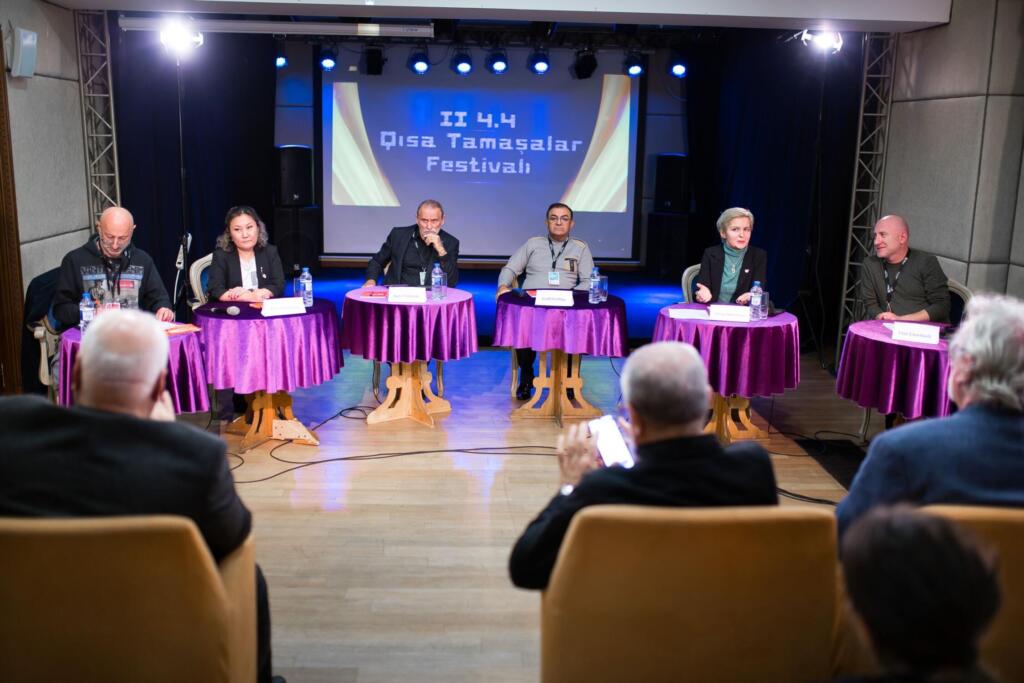
Panel discussion.
Two of my personal favorites of the festival were the two productions of its touring and out-of-competition program: Kote Marjanishvili State Drama Theatre (Kreutzer Sonata) by Levan Tsuladze and The Pistachio Tree at Maksud Ibrahimbeyov Creativity Centre.
Kreutzer Sonata was an experience of directorial dialogue with the audience about the problem of violence in modern society, painful passions, the dark side of the human soul, and morality and morality as a weapon in the hands of the inflamed mind. Of course, the director avoided talking in the context of immediacy, but this theatrical variation of the story has gained additional meaning in the context of cultural restrictions and prohibitions in Leo Tolstoy’s homeland.
Kreutzer Sonata
The experience of nostalgic confessionalism and reflection on adult childhood in a broken world was presented in the house-museum of the prominent writer and screenwriter Maksud Ibrahimbeyov. Pistachio Tree is a story of a childhood remembered against the backdrop of war, observations of how war changes people, and how the soul matures, in which the sprouts of childhood are always preserved. The performance of Vagif Asadov and Tural Vagifoghlu performed in the writer’s studio takes on a special piercing tone that unites people of different generations, professions, and countries. Maybe because he, following the author, speaks to the viewer in the universal language of the heart, which does not require translation?
Pistachio Tree
The II 4.4 Short Performances Festival, which has come to an end, but left a lasting sound, as noticed by the Festival’s director Elchin Jafarov, gave a new breath to the Azerbaijani theatre, which opened up to the world theatre. Whatever path of development the theatre in Azerbaijan chooses, whatever trends and tendencies it adapts to its realities, it has a special sound, tonality, and distinctive features. Surprisingly musical as the language of the country, it skilfully refers to the traditions of its past, finding in them not an extinguished fire of the past, but sparks of bright flame that can warm and dazzle with the brightest of emotions and help its spectators to keep their perception sharp. It is no coincidence that Baku is called the City of Fires. “Tongues of flame” (skyscraper towers) descended from the emblem of the city, and winked at the narrow, mysterious streets of the Old City, in the labyrinth of which it is not at all scary to get lost. On the contrary, the unpredictability of the streets and architecture excites the imagination. Who knows what lurks around that corner? Maybe it’s another ironic urban monument (to an old captain, a shoeshiner, or a girl with a cell phone), or maybe it’s an indigenous resident of the square named after the satirical poet Sabir – a cat of inconceivable colouring?
In Baku – East, and West, the luxury of European style and oriental luxury do not just meet but merge in a harmony of beauty. Theatre in Azerbaijan has a worthy example to follow – the architecture of its capital. National traditions of the culture here can and should be incorporated into the contemporary world theatrical context. Respect for the culture and traditions of the past, a new look at them through generations and centuries – this is what is interesting to see today in the land of lights. Fortresses of the Old City are not separated but combined with the Baku of “modern times”: its “little Venice,” the crystal palace, and skyscrapers. These two Baku do not argue, do not defend each other, but combine, live together with common sorrows and joys as members of a family, where at one table meet several generations. No bustle, no mishmash – vastness, lights, spice in the air, memory and lingering thread, strong as the one used to weave the carpets of the maidens near the Maiden Tower – the performance city, as you have already understood, deserves its own prize at the festival. However, this is no longer a short film format, but a special performance promenade, which I advise everyone to visit.
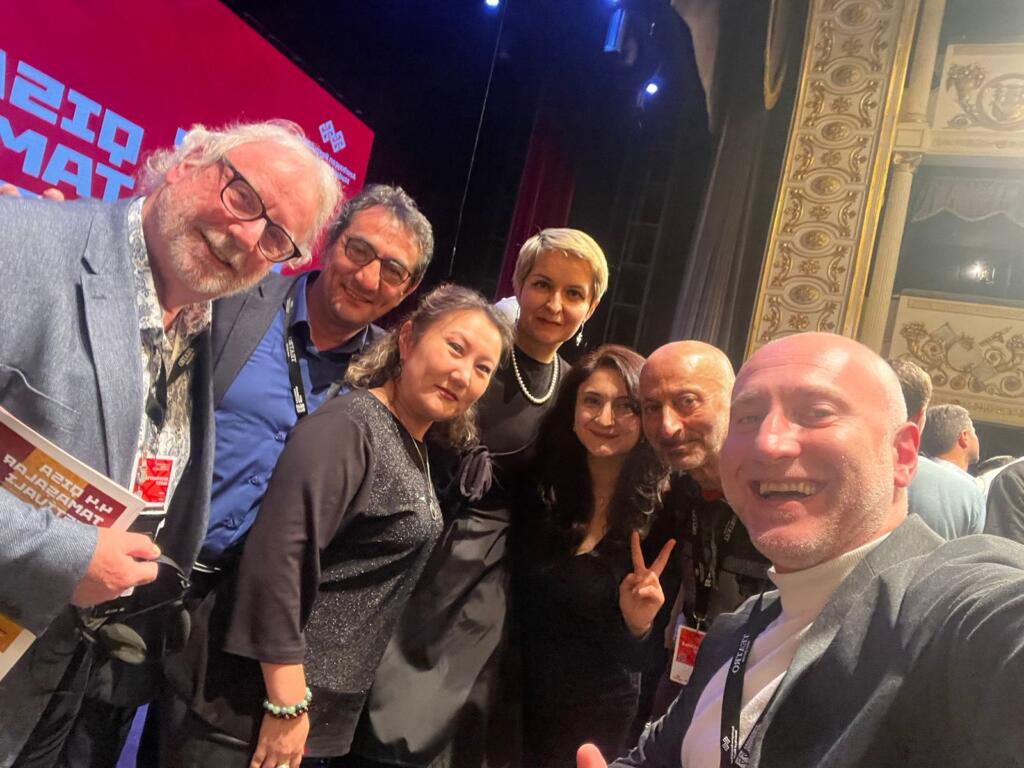
Traditional Festival Selfies of Theater Experts and Laureates: (From Left to Right) Roger McCann (UK), Tarlan Rasulov (Azerbaijan), Anara Erkebay (Kazakhstan), Emiliia Dementsova (Russia), Irada Gozalova (Azerbaijan), David Buhrikidze (Georgia), Lasha Chkhartishvili (Georgia)
This post was written by the author in their personal capacity.The opinions expressed in this article are the author’s own and do not reflect the view of The Theatre Times, their staff or collaborators.
This post was written by Emiliia Dementsova.
The views expressed here belong to the author and do not necessarily reflect our views and opinions.

